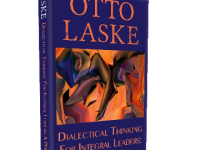From AQAL to AQAT: Dialog in an Integral Perspective In this paper, presented at the 2014 Integral European Conference, Budapest, Prof. Bruno Frischherz compares with great clarity the methodological tools offered by Wilber's Integral Theory to those offered by Laske's CDF. The author shows that AQAL in its present form -- focusing only on I, We, and It(s) -- omits the category of You and, as a consequence, excludes the dialectic fundamental to engaging in dialog. The author also shows the lack of an ontological foundation of Integral Theory, accounting for its irrealism in the sense of Bhaskar, and thus shows it to be a continuation of the irrealism of western philosophy since Parmenides. He proposes a dialectical extension of AQAL called AQAT -- "all quadrants, all (CDF) thought forms" -- able to render the moves-in-thought naturally occurring in integral thinking but suppressed by Wilber. The paper stands as the clearest outline of AQAL as a purely formal logical theory with false pretensions to totalizing human experience. dialog_in_an_integral_perspective Read More...
Tag: Cognitive Dimension
A Developmental Agenda of Concrete Utopianism: Culture Transformation in the Anthropocene
This text by Otto Laske and Alessandro Rossi describes the use of the Constructive Developmental Framework as a culture transformation instrument. Pragmatic implementations of CDF are geared to strengthening dialectical thinking in groups, teams, committees, and coalitions, whether commercial, academic, political, or educational, with an eye on increasing collaborative intelligence. The focus of such work is placed intoplaying “dialectical thought games” in real time, targeting a real-world problem. The authors think that innovation has to become commensurate with the challenges now arising from the human ability to transform nature (anthropocene). Accordingly, their call to action is focused on dialectical cognition, not psychology or social-emotional development. The main topics are: The need for a new concept of human being and of work Handling complexity in the anthropocene is not “business as usual” Moving from systems thinking to transformational (dialectical) thinking has become a societal necessity Human development needs social support in the zone of proximal development Innovation requires collaborative intelligence and maturity in teams A Developmental Agenda EN Read More...
Russian research on dialectical thinking in children — Developing self-authored thinking
In the dialectic-starved West we tend to blindly follow formal logical thinking to the bitter end (e.g., global warming). However, there are alternatives, especially when one becomes informed by the work of Vygotsky, Piaget, Adorno, and Bhaskar, and the empirical work of Basseches and Laske. In the article here posted psychologist Veraksa et al. report on experimenting with teaching pre-school children dialectical thinking. Speaking of "leadership development", I suggest you start here ...Structural dialectical approach in psychology Read More...
DTF as a Tool for Creating Integral Collaborations
Solving real world problems tests professionals’ present level of cognitive development. A good training ground for working on hard problems in teams is the Case Study Cohort Method (CSCM) developed at the Interdevelopmental Institute. The method consists of a having members of a team assessing an individual’s or team’s level of cognitive maturity debate the empirical evidence that speaks in favor of one or the other level of subjects’ cognitive flexibility. Although the material for the debate is “academic”, consisting of a transcription of a 1-hr cognitive interview, the opportunities for sharpening one’s use of dialectical thought forms is the same as in a real-world situation in which an individual or team is looking for solutions. In this paper, I describe both the method and show what it entails to learn to use dialectical thought forms, envisioning that such use could become a social practice with major benefits for solving global economic and political problems. (A reprint from Integral Review 11, no. 3, 2015). DTF as a Tool for Creating Integral Collaborations Read More...
Nick Shannon on “What Can IDM Offer the Integral Movement?”
In this article, written in response to the 2nd ITC conference (2010), Nick Shannon outlined four main vantage points from which teachings at the Otto Laske Interdevelopmental Institute (IDM) elucidate and strengthen integral thinking: (1) upper left quadrant, (2) dialectical unfolding of concepts, (3) moving from contextual to transformation language, and (4) cognitive development and higher levels of consciousness. Shannon thought that in all of these regards, Otto Laske's teaching clarifies and advances integral thinking. To this day, the promise of this teaching, more recently reinforced by Bhaskar's dialectical writings (1990s), has remained largely unknown or unnoticed. We are reprinting N. Shannon's thoughts here to invite further engagement of integral practitioners with dialectic, a recent topic of Laske's book entitled "Dialectical thinking for integral leaders: A primer" (Integral Publishers, 2015). Shannon, What can IDM offer the Integral Movement Read More...
Executive Development as Adult Development
This article, chapter 9 of Demick et al’s Handbook of Adult Development (Springer 2002), tries to escape the tunnel vision of organizational theorists and consultants alike who, while glorifying leaders, cannot penetrate to the adult-developmental origins of leadership and get lost in psychological or spiritual speculations, or else lists of competences. Instead, the article adopts the distinction between "ontic" and "agentic" development, that is, the development that happens over human resources' life span development, on one hand, and the organizational mechanisms put in place to "develop" them, on the other. The article conceptualizes executive development as a lawful developmental modification of an individual's professional agenda and universe of discourse in the cognitive and social-emotional sense or, to speak with E. Jaques, his/her Size of Person. Refining Argyris, three levels of professional agenda are distinguished. M. W. McCall Jr.'s (1998) and D. T. Hall's writings (1996) are focused on in order to clarify contemporary theorists' views, referring to McCall's "five dilemmas" of human development in organizations. The article focuses on the dialectic of managerial strengths and weaknesses, the organizational shift to the "Proteian" (internal) career, and introduces Kegan's and Basseches' work alongside with empirical findings of the author. Laske, Executive Development... Read More...
